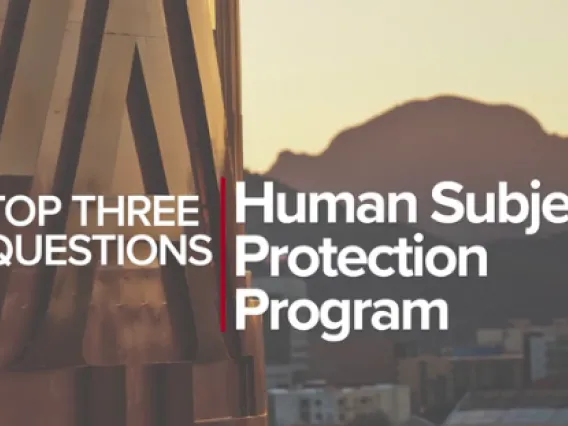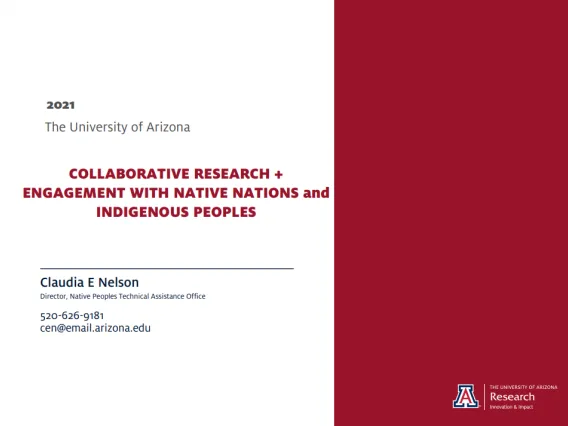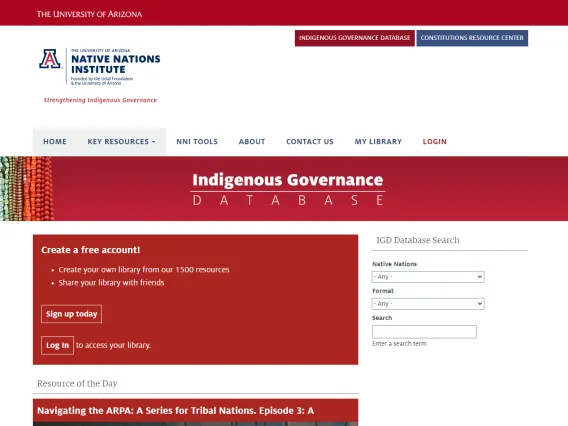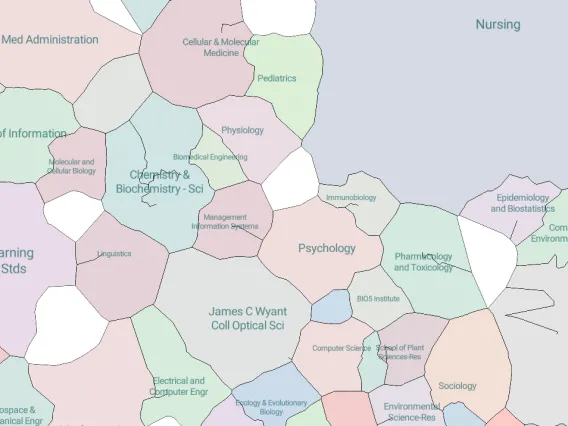Training Session on Tribal Consultation (2020)
As a member of the Partnership for Native American Cancer Prevention Outreach Core, Dr. Francine Gachupin (Department of Family and Community Medicine, University of Arizona) has developed some helpful guidelines and first steps for researchers seeking to work with Native American communities.

The HSPP, as the administrative and regulatory support program to the Institutional Review Boards (IRBs), works in collaboration with the research community to maintain an ethical and compliant research program. An IRB must review all research and related activities involving human subjects conducted at the University of Arizona or when the University is a responsible participant.

The Responsible Conduct of Research Program provides training and workshops that fulfill federal training requirements set forth by the National Institutes of Health (NIH), the National Science Foundation (NSF), and the National Institute of Food and Agriculture (NIFA).

SPCS, a unit of Research, Innovation & Impact (RII), assists the University of Arizona research community in its efforts to secure external funding by providing high quality administrative, contracting and financial services to ensure proper stewardship of those funds and to minimize the risk to university resources.

The Native Peoples Technical Assistance Office has created a document which provides an overview of research and engagement with Native Nations, including the ABOR 1-118 Consultation Policy and UArizona Guidelines.

The Native Nations Institute maintains an Indigenous Governance Database, a growing resource collection of video, audio, and written materials relevant to tribal leadership, other tribal professionals, scholars, students, and policymakers searching for resources about nation building, sovereignty, governance, leadership, and sustainable economic and community development in Indigenous country.

The University now has a way to map how academic researchers across campus collaborate (KMAP).
Search for people, departments, colleges, funding agencies, grants, and research topics!
Additional Resources
Walk Softly and Listen Carefully: Building Research Relationships with Tribal Communities
For more information on consultation and culturally respectful research, see Walk Softly and Listen Carefully: Building Research Relationships with Tribal Communities, by the NCAI Policy Research Center and MSU Center for Native Health Partnerships.
Blood Journey
Please watch the video Blood Journey produced by the New York Times in 2010, reflecting on the research injustice experienced by the Havasupai Tribe of Arizona.
National Congress of American Indians
The National Congress of American Indians provides numerous resources including publications, videos, and policy briefs.
Tribal Institutional Review Boards (IRBs)
See Indian Health Service Institutional Review Boards for a comprehensive list of all Indian Health Service IRBs by area, including Independent Tribal IRBs.
Healthcare Options for Native Students
Hear from Campus Health (UArizona), El Rio Community Health, San Xavier Health Center, Tucson Indian Center, and Urgent Care Clinic about healthcare options for Native Students.
EJ Webinar Series for Tribes and Indigenous Peoples – August 2024: Water is Life
This webinar is part of a monthly series of webinars hosted by the U.S. Environmental Protection Agency’s Office of Environmental Justice and External Civil Rights.
These resources were originally posted on the University of Arizona Native American Advancement, Initiatives, and Research (NAAIR) Web Portal. Please visit the NAAIR's website for additional information and resources.
Staff and Student Resources
A travel authorization form is required before any planned travel. This needs to be completed and submitted to your appropriate department.
Graduate Students in IndigeFEWSS and community members, to ensure adequate time for processing, please make sure that you submit travel requests at least 3 weeks prior to your departure date. If you are requiring airfare, please submit at least 4 weeks prior to departure. Late requests will not have a priority and will be added into our queue as they are received. Required documents include, Agendas, invitations, lodging information, mileage, and airfare requests (please submit a screenshot of the requested itinerary).
Travel reimbursements should be completed as soon as possible after travel is completed. You will need to make sure all your documents are submitted on the Transaction Form below.
For IndigeFEWSS students and community members that are seeking to request reimbursement or travel arrangements, please submit a reimbursement or travel request.
For reimbursements please make sure that you complete a travel expense form. Be sure to download the form and save it to your computer, as the TE# will change with each download.
You will also be responsible for knowing the travel rates for hotel and per diem.
UArizona Campus Support
The space in the IRes pod can be reserved using the following link: https://arizona216296.monday.com/boards/9650736732/views/205040555
As funds are available, the Indigenous Resilience Center works to co-sponsor on-campus events. IRes is committed to strengthening campus partnerships and collaborations by broadening the reach of our work. We like to support as many events as we can that are in line with IRes’s vision and goals. Please visit https://resilience.arizona.edu/who-we-are/mission for more information.
Please request funds at least one (1) month prior to the event, so a determination can be made regarding available funds and necessary arrangements can be made. Please use the sponsorship request form.
IRes Team Communications
These steps will help us with our outreach efforts:
- Share the IRes website: https://resilience.arizona.edu/
- Invite others to sign-up for the IRes newsletter for updates, events, and opportunities: https://resilience.arizona.edu/newsletter
- If you are doing an in-person event you can bring the below newsletter sign-up sheet and handout.
- When posting about IRes on social media you can tag us:
Twitter: @UA_IResCenter Instagram: @uaindigenousresilience - Use the full title whenever possible: Indigenous Resilience Center
Use IRes logo for presentations (See below)
Use IRes without the hyphen
Cite funders. After the title state that “The Indigenous Resilience Center is supported by the Agnese Nelms Haury Program in Environment and Social Justice.” - For UArizona campus events, list the event on:
UArizona Master Calendar.
University of Arizona Native American Advancement, Initiatives, and Research Web Portal: Add Event | Native American Advancement, Initiatives, and Research (arizona.edu) - Photo policy: obtain a UArizona media release form for all photos taken. Take a photo of the release form to have as backup. Media release form is located here: https://brand.arizona.edu/download/multi-media-consent-and-release-form
- Check the AIRES page for additional support information for IRes: https://environment.arizona.edu/airesupport
- For general contact please direct people here: https://forms.gle/NUo8RCmMdd5bJ37q7
Book IRes Space Here
The Indigenous Resilience Center (IRes) space is open to community members, students, and partners for meetings, gatherings, and events. While we welcome external bookings, IRes programming and business will always take scheduling priority. We encourage those interested in using the space to plan ahead and remain flexible as we work to support the Center’s ongoing commitments.
Partner Toolkit, One-Page Handout, Sign-up Sheet, and Logos
One-Page Handout (8" x 8", PDF) Sign-Up Sheet (PDF)
Primary Logo (PNG) Primary Logo REVERSE (PNG)
Alternate Logo (PNG) Alternate Logo REVERSE (PNG)
IRes Graphic (JPG) IRes Graphic (Transparent PNG)
